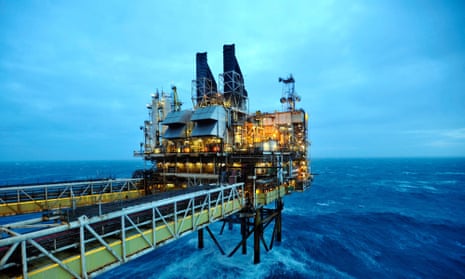The UK’s two oil “supermajors”, BP and Royal Dutch Shell, have outlined plans for a more frugal future to withstand stubbornly low oil prices as they beat profit expectations in the third quarter.
While both firms outperformed forecasts, Shell won greater plaudits from investors thanks to rapid progress on cutting costs and a hefty production boost from its £43bn takeover of gas specialist BG.
Shell’s underlying net profit for the three months to the end of September rose 18% to $2.8bn, beating analyst forecasts of $1.7bn.
Britain’s biggest company said its performance had improved after a disappointing second quarter as it cut costs following its takeover of BG Group in January.
Chief financial officer Simon Henry said the BG deal had “turbocharged” the company, helping increase production by 25% to 3.6m barrels per day (bpd) from 2.9m this time last year.
But the cost of the takeover, coupled with low oil prices, has seen the company’s debt balloon from $26.6bn last year to nearly $79bn, adding to pressure to reduce spending and sell assets.
Shell expects its capital investment to fall $25bn next year – at the lowest end of its $25bn to $30bn guidance range.
Henry pointed out that Shell is already being thrifty, with this year’s $29bn in capital investment some $18bn less than Shell and BG were spending as separate companies in 2014.
Oil companies around the world have cut spending severely to cope with a plunge in the oil price that has weighed on the industry for more than two years and that both companies said is unlikely to reverse this year.
Henry warned that continued retrenchment could include further job losses in the North Sea, where Shell has already cut 1,000 staff since 2014.
“I cannot rule out further changes in the number of jobs,” he said, adding that Shell was ready to sell North Sea assets but hadn’t received attractive offers.
The firm is in the process of selling 16 assets as part of a $30bn sale programme as it looks to bolster its balance sheet following the BG deal.
Shell’s chief executive, Ben van Beurden, stressed the need for caution despite the better-than-expected results, saying: “Lower oil prices continue to be a significant challenge across the business, and the outlook remains uncertain.”
Shell’s cost cuts and progress in integrating BG won approval from the markets, sending its shares up nearly 4% to £21.15.
But while BP beat expectations, investors were less impressed than they were with Shell and its stock fell 4.5% to £4.62.
Investors in both companies stand to receive a £2.5bn boost to their dividends from sterling’s weakness this year, according to Capita Dividend Monitor, which expects their combined payouts to be £18.6bn.
At BP, net profit almost halved to $933m in the third quarter from $1.8bn a year earlier, although the result was better than the average analyst forecast of $780m, according to Reuters.
The company blamed lower oil prices as well as higher costs for writing off exploration projects and cancelling rigs. BP scrapped plans to drill in Australia’s Great Australian Bight last month after commissioning a high-spec oil rig in Singapore.
Like Shell, BP is battening down the hatches for continued low oil prices, with capital spending due to be $16bn this year, $1bn less than predicted in April.
The company has largely worked through the costs of its Gulf of Mexico oil spill but added $189m to its overall bill, which has now reached $61.8bn since the incident in April 2010.
Both companies’ shares have been under pressure as the oil price hovers at about $50 a barrel and rising doubts about Opec’s ability to organise a promised production cut.
But Shell’s finance chief Simon Henry said the efforts to slash costs will put it in “very strong cash generating territory” if prices rise again.
He said every $10 rise in the price of Brent crude was worth $5bn to Shell and would be worth $6bn within years, signalling huge rewards if oil prices eventually reach $100 again. “That’s another $30bn in the bank each year,” he said.
Energy industry commentators have pointed to the falling cost of renewables versus fossil fuels and Shell’s head of new energies and integrate gas, Maarten Wetselaar, said solar and wind were already undercutting gas in some areas.
He said solar panels were “equivalent or cheaper than fully costed gas” in areas near the equator when stripping out the cost of period with limited sunshine.
He said the same was true of wind power in the North Sea, although he stressed that gas still has an advantage when windless days are factored in.

Comments (…)
Sign in or create your Guardian account to join the discussion